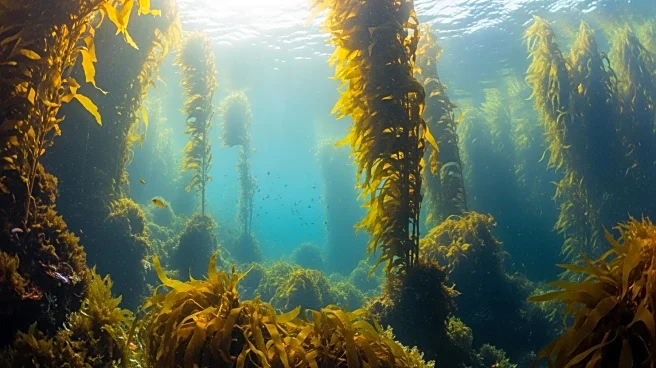What's Happening?
Recent research has focused on enhancing kelp productivity through restoration and assisted adaptation interventions in response to ocean warming. The study, conducted along the Western Australian coast, measured kelp productivity across three locations
over a year. The research utilized environmental data from the Copernicus Marine Service and NASA's Ocean Biology Processing Group to assess the impact of temperature and other factors on kelp growth. The study found a significant relationship between kelp productivity and temperature, suggesting that temperature plays a crucial role in kelp physiology. The research also explored predictive models to assess kelp productivity under current and future ocean warming scenarios, using data from global climate models.
Why It's Important?
This research is significant as it addresses the challenges posed by ocean warming on marine ecosystems, particularly kelp forests, which are vital for biodiversity and coastal protection. By understanding the environmental drivers of kelp productivity, the study provides insights into how restoration and adaptation strategies can be optimized to mitigate the impacts of climate change. The findings have implications for policymakers and conservationists aiming to preserve marine biodiversity and sustain fisheries that depend on healthy kelp ecosystems. The study's predictive models offer a tool for anticipating future changes and planning effective interventions.
What's Next?
The study suggests that further research is needed to refine predictive models and explore additional environmental factors influencing kelp productivity. Future efforts may focus on implementing the identified strategies in real-world restoration projects and monitoring their effectiveness over time. Collaboration between scientists, policymakers, and local communities will be crucial in developing adaptive management plans that can respond to ongoing climate changes. Additionally, the study highlights the need for continued investment in climate research and conservation initiatives to protect marine ecosystems.
Beyond the Headlines
The research underscores the broader implications of climate change on marine ecosystems and the importance of adaptive strategies in conservation efforts. It highlights the interconnectedness of environmental factors and the need for a holistic approach to ecosystem management. The study also raises ethical considerations regarding human intervention in natural systems and the potential long-term impacts of such actions. As climate change continues to alter marine environments, the role of science in guiding sustainable practices becomes increasingly critical.















